EBP: Ethics, Practices, and Evaluation in Policing Strategies
VerifiedAdded on 2023/01/03
|15
|5416
|382
Report
AI Summary
This report provides a comprehensive analysis of evidence-based policing (EBP), emphasizing its ethical considerations, practical applications, and evaluation of outcomes. The introduction defines EBP and highlights its importance in modern law enforcement, focusing on empirical research and statistical analysis for informed decision-making. Assessment 1 delves into the systematic understanding of EBP concerning ethics and values, examining how these principles guide the implementation of policing strategies and contribute to public trust. It explores the National Decision Model (NDM) and its ethical relevance. Assessment 2 critically evaluates the results attained from policing operations and tasks, including emergency responses and crime prevention, and discusses the significance of addressing police misconduct. The report also touches on the role of technology in improving accountability and the need for continuous improvement in policing practices, underscoring the importance of proactive measures and community engagement for ensuring public safety and crime reduction. The report concludes by reflecting on the roles and contributions of EBP practices.
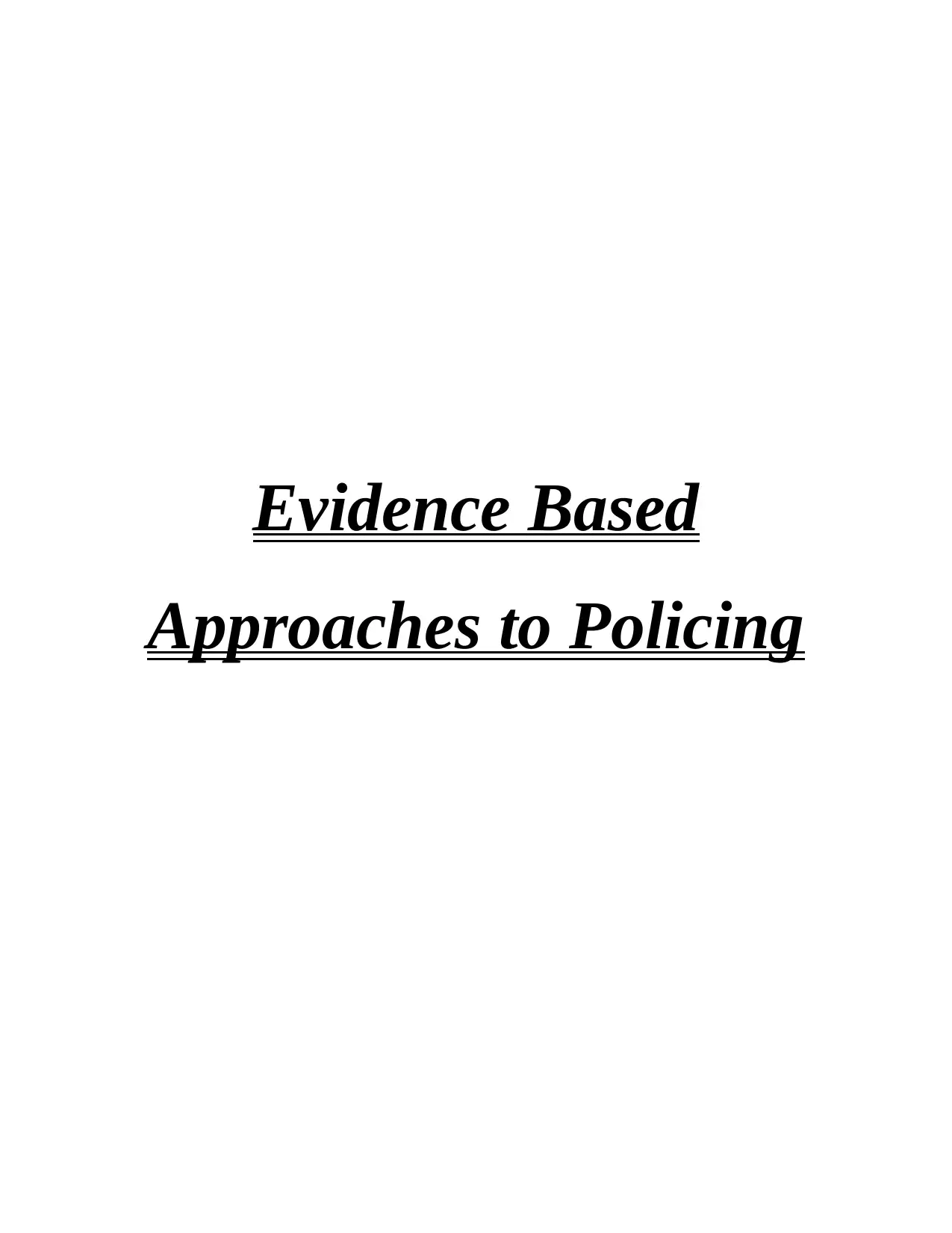
Evidence Based
Approaches to Policing
Approaches to Policing
Paraphrase This Document
Need a fresh take? Get an instant paraphrase of this document with our AI Paraphraser
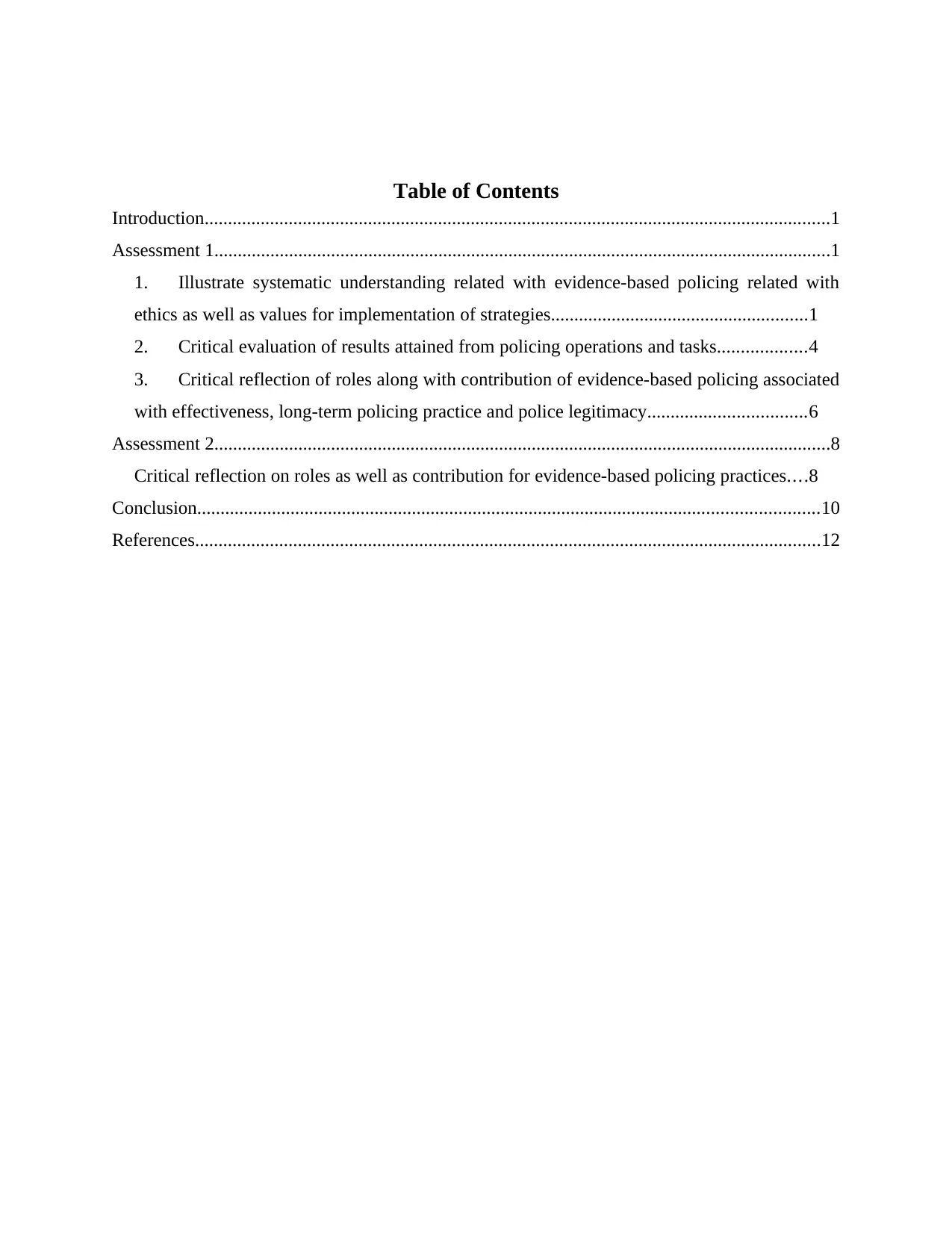
Table of Contents
Introduction......................................................................................................................................1
Assessment 1....................................................................................................................................1
1. Illustrate systematic understanding related with evidence-based policing related with
ethics as well as values for implementation of strategies.......................................................1
2. Critical evaluation of results attained from policing operations and tasks...................4
3. Critical reflection of roles along with contribution of evidence-based policing associated
with effectiveness, long-term policing practice and police legitimacy..................................6
Assessment 2....................................................................................................................................8
Critical reflection on roles as well as contribution for evidence-based policing practices....8
Conclusion.....................................................................................................................................10
References......................................................................................................................................12
Introduction......................................................................................................................................1
Assessment 1....................................................................................................................................1
1. Illustrate systematic understanding related with evidence-based policing related with
ethics as well as values for implementation of strategies.......................................................1
2. Critical evaluation of results attained from policing operations and tasks...................4
3. Critical reflection of roles along with contribution of evidence-based policing associated
with effectiveness, long-term policing practice and police legitimacy..................................6
Assessment 2....................................................................................................................................8
Critical reflection on roles as well as contribution for evidence-based policing practices....8
Conclusion.....................................................................................................................................10
References......................................................................................................................................12
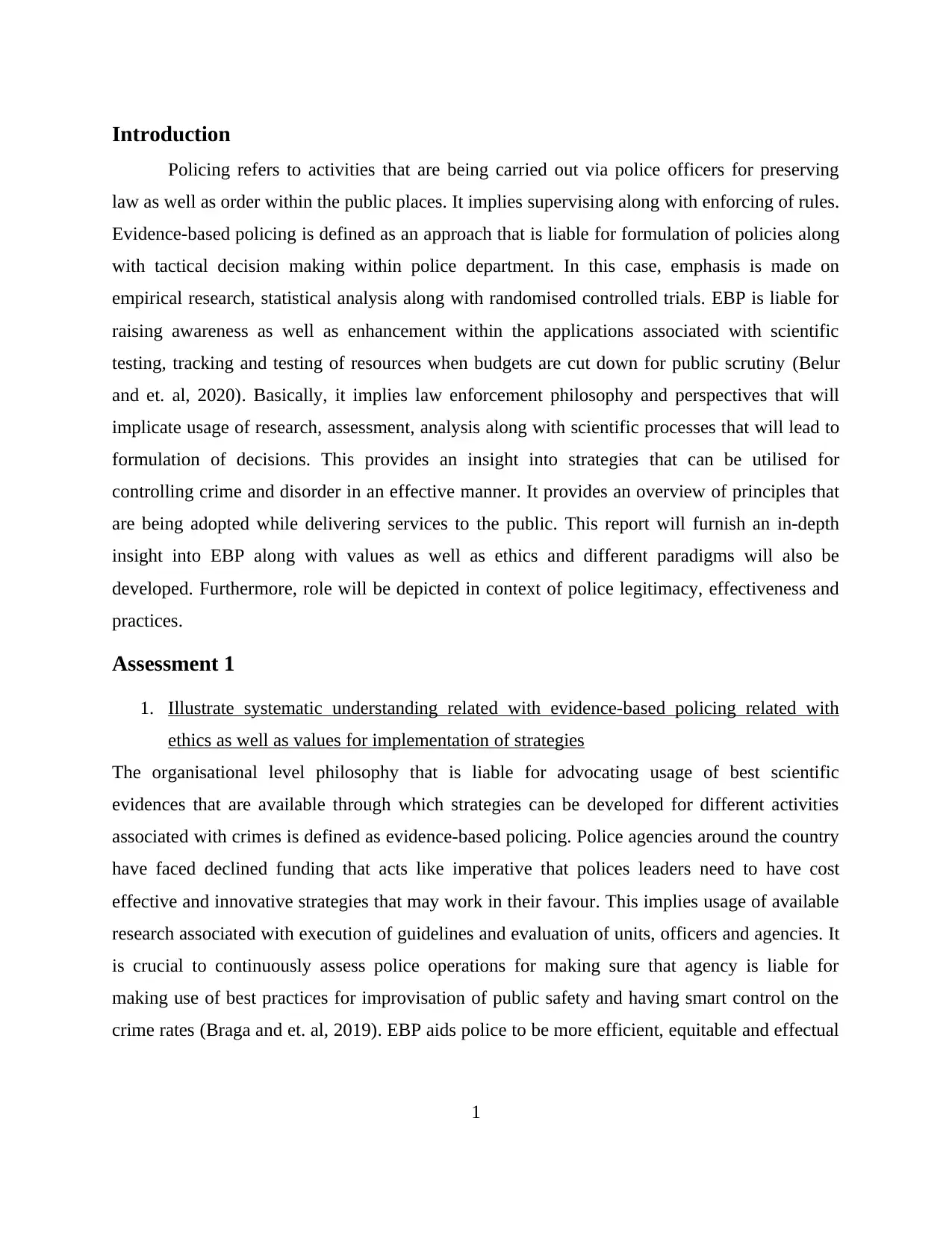
Introduction
Policing refers to activities that are being carried out via police officers for preserving
law as well as order within the public places. It implies supervising along with enforcing of rules.
Evidence-based policing is defined as an approach that is liable for formulation of policies along
with tactical decision making within police department. In this case, emphasis is made on
empirical research, statistical analysis along with randomised controlled trials. EBP is liable for
raising awareness as well as enhancement within the applications associated with scientific
testing, tracking and testing of resources when budgets are cut down for public scrutiny (Belur
and et. al, 2020). Basically, it implies law enforcement philosophy and perspectives that will
implicate usage of research, assessment, analysis along with scientific processes that will lead to
formulation of decisions. This provides an insight into strategies that can be utilised for
controlling crime and disorder in an effective manner. It provides an overview of principles that
are being adopted while delivering services to the public. This report will furnish an in-depth
insight into EBP along with values as well as ethics and different paradigms will also be
developed. Furthermore, role will be depicted in context of police legitimacy, effectiveness and
practices.
Assessment 1
1. Illustrate systematic understanding related with evidence-based policing related with
ethics as well as values for implementation of strategies
The organisational level philosophy that is liable for advocating usage of best scientific
evidences that are available through which strategies can be developed for different activities
associated with crimes is defined as evidence-based policing. Police agencies around the country
have faced declined funding that acts like imperative that polices leaders need to have cost
effective and innovative strategies that may work in their favour. This implies usage of available
research associated with execution of guidelines and evaluation of units, officers and agencies. It
is crucial to continuously assess police operations for making sure that agency is liable for
making use of best practices for improvisation of public safety and having smart control on the
crime rates (Braga and et. al, 2019). EBP aids police to be more efficient, equitable and effectual
1
Policing refers to activities that are being carried out via police officers for preserving
law as well as order within the public places. It implies supervising along with enforcing of rules.
Evidence-based policing is defined as an approach that is liable for formulation of policies along
with tactical decision making within police department. In this case, emphasis is made on
empirical research, statistical analysis along with randomised controlled trials. EBP is liable for
raising awareness as well as enhancement within the applications associated with scientific
testing, tracking and testing of resources when budgets are cut down for public scrutiny (Belur
and et. al, 2020). Basically, it implies law enforcement philosophy and perspectives that will
implicate usage of research, assessment, analysis along with scientific processes that will lead to
formulation of decisions. This provides an insight into strategies that can be utilised for
controlling crime and disorder in an effective manner. It provides an overview of principles that
are being adopted while delivering services to the public. This report will furnish an in-depth
insight into EBP along with values as well as ethics and different paradigms will also be
developed. Furthermore, role will be depicted in context of police legitimacy, effectiveness and
practices.
Assessment 1
1. Illustrate systematic understanding related with evidence-based policing related with
ethics as well as values for implementation of strategies
The organisational level philosophy that is liable for advocating usage of best scientific
evidences that are available through which strategies can be developed for different activities
associated with crimes is defined as evidence-based policing. Police agencies around the country
have faced declined funding that acts like imperative that polices leaders need to have cost
effective and innovative strategies that may work in their favour. This implies usage of available
research associated with execution of guidelines and evaluation of units, officers and agencies. It
is crucial to continuously assess police operations for making sure that agency is liable for
making use of best practices for improvisation of public safety and having smart control on the
crime rates (Braga and et. al, 2019). EBP aids police to be more efficient, equitable and effectual
1
⊘ This is a preview!⊘
Do you want full access?
Subscribe today to unlock all pages.

Trusted by 1+ million students worldwide

that aid within enhancement of perception of legitimacy through reduction of reliance based on
strategies that depends on opinion or the manner the things can be carried out.
Values implies guide for agency as well their employees. In addition to this, law
enforcement agencies posses distinct values that depends on their functionalities. The Code of
Ethics acts like written guide for certain principles that each individual of policing profession is
anticipated to uphold as well as have standardised behaviour for accomplishment of
requirements. Policing via consent requires support from public that can be developed via having
learning associated with trying to acknowledge the matters that lead to cause certain concerns.
The British police services works traditionally with furnishing open to public through which they
involve dialogues related with shared goals as well as role to serve the community and this just
do not involve enforcing the laws and regulations. Furthermore, police entirely depends on
having active co-operation from public as this will lead them to fight with the situations in an
effective manner before the things get complicated (Di Nota and Huhta, 2019). An example can
be taken into consideration is that they need public assistance for reporting certain crimes as well
as breaches of law that takes place. Such kind of support from public is crucial for detecting
crime as well as any threatening activities.
Values are not completely restricted to what they believes is core value but also depends
on personal as well as outside values that are being possessed by them. For an instance, it is
important that each employee of policing department is aware about all the values of agency for
having all the details associated with incorporation of values within their each day activities. In
addition to this, values are being set with aim for policing as well as interacting ethics for
upholding aim so that they can deliver their liabilities in an appropriate manner. The integral
guide for ethics all with values that police department must adhere to are specified beneath:
It is important that all the policing officers must act with compassion, patience; courtesy
along with integrity that will illustrate that there must not be any kind of favour or
disfavour in terms of what they do. They have to be sensitive with reference to needs
along with dignity of victims who have been impacted and specify respect of all in terms
of human rights.
It is important that they must opt for professional judgement, discretion as well as
common sense that will guide all the police officials or service providers to be
2
strategies that depends on opinion or the manner the things can be carried out.
Values implies guide for agency as well their employees. In addition to this, law
enforcement agencies posses distinct values that depends on their functionalities. The Code of
Ethics acts like written guide for certain principles that each individual of policing profession is
anticipated to uphold as well as have standardised behaviour for accomplishment of
requirements. Policing via consent requires support from public that can be developed via having
learning associated with trying to acknowledge the matters that lead to cause certain concerns.
The British police services works traditionally with furnishing open to public through which they
involve dialogues related with shared goals as well as role to serve the community and this just
do not involve enforcing the laws and regulations. Furthermore, police entirely depends on
having active co-operation from public as this will lead them to fight with the situations in an
effective manner before the things get complicated (Di Nota and Huhta, 2019). An example can
be taken into consideration is that they need public assistance for reporting certain crimes as well
as breaches of law that takes place. Such kind of support from public is crucial for detecting
crime as well as any threatening activities.
Values are not completely restricted to what they believes is core value but also depends
on personal as well as outside values that are being possessed by them. For an instance, it is
important that each employee of policing department is aware about all the values of agency for
having all the details associated with incorporation of values within their each day activities. In
addition to this, values are being set with aim for policing as well as interacting ethics for
upholding aim so that they can deliver their liabilities in an appropriate manner. The integral
guide for ethics all with values that police department must adhere to are specified beneath:
It is important that all the policing officers must act with compassion, patience; courtesy
along with integrity that will illustrate that there must not be any kind of favour or
disfavour in terms of what they do. They have to be sensitive with reference to needs
along with dignity of victims who have been impacted and specify respect of all in terms
of human rights.
It is important that they must opt for professional judgement, discretion as well as
common sense that will guide all the police officials or service providers to be
2
Paraphrase This Document
Need a fresh take? Get an instant paraphrase of this document with our AI Paraphraser
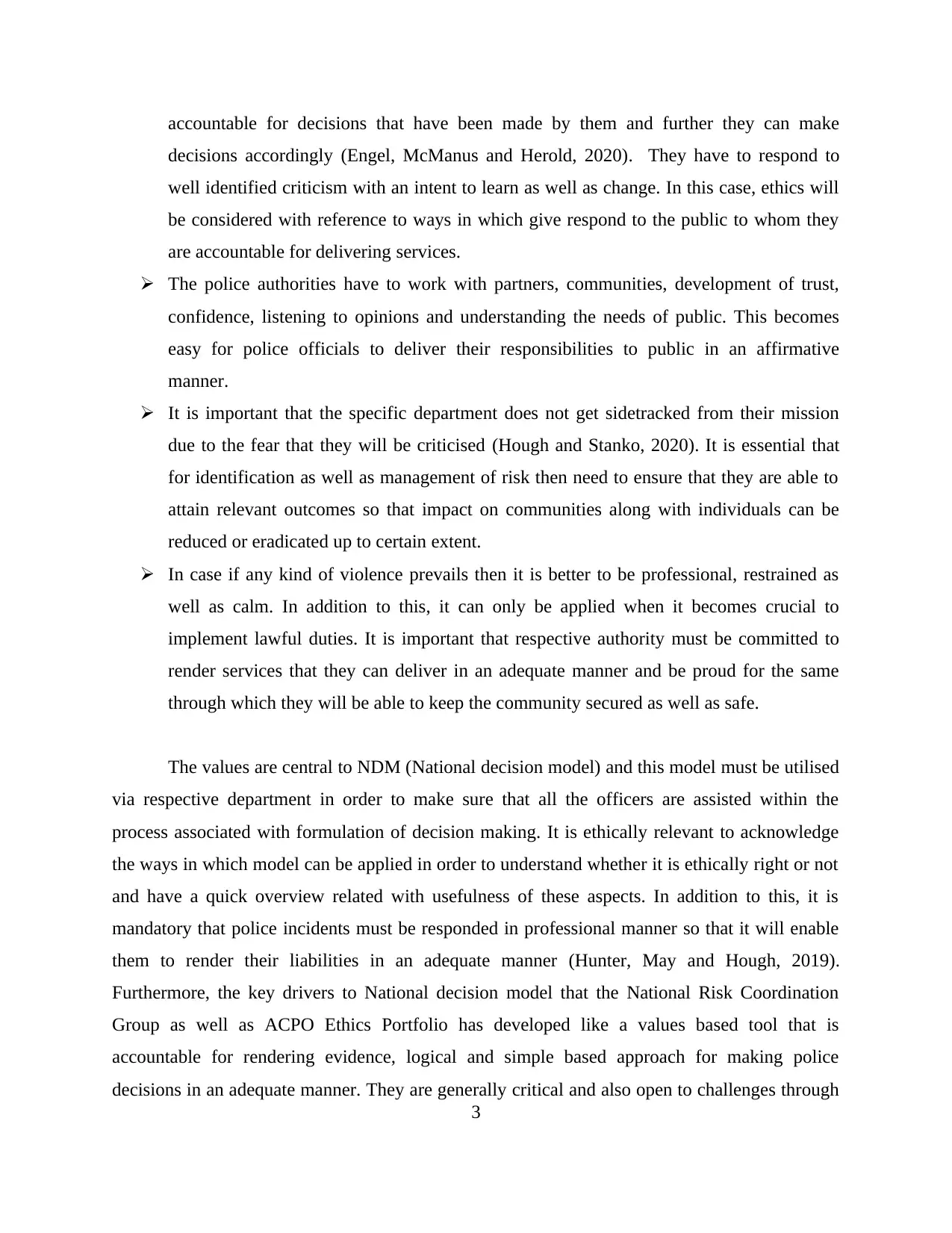
accountable for decisions that have been made by them and further they can make
decisions accordingly (Engel, McManus and Herold, 2020). They have to respond to
well identified criticism with an intent to learn as well as change. In this case, ethics will
be considered with reference to ways in which give respond to the public to whom they
are accountable for delivering services.
The police authorities have to work with partners, communities, development of trust,
confidence, listening to opinions and understanding the needs of public. This becomes
easy for police officials to deliver their responsibilities to public in an affirmative
manner.
It is important that the specific department does not get sidetracked from their mission
due to the fear that they will be criticised (Hough and Stanko, 2020). It is essential that
for identification as well as management of risk then need to ensure that they are able to
attain relevant outcomes so that impact on communities along with individuals can be
reduced or eradicated up to certain extent.
In case if any kind of violence prevails then it is better to be professional, restrained as
well as calm. In addition to this, it can only be applied when it becomes crucial to
implement lawful duties. It is important that respective authority must be committed to
render services that they can deliver in an adequate manner and be proud for the same
through which they will be able to keep the community secured as well as safe.
The values are central to NDM (National decision model) and this model must be utilised
via respective department in order to make sure that all the officers are assisted within the
process associated with formulation of decision making. It is ethically relevant to acknowledge
the ways in which model can be applied in order to understand whether it is ethically right or not
and have a quick overview related with usefulness of these aspects. In addition to this, it is
mandatory that police incidents must be responded in professional manner so that it will enable
them to render their liabilities in an adequate manner (Hunter, May and Hough, 2019).
Furthermore, the key drivers to National decision model that the National Risk Coordination
Group as well as ACPO Ethics Portfolio has developed like a values based tool that is
accountable for rendering evidence, logical and simple based approach for making police
decisions in an adequate manner. They are generally critical and also open to challenges through
3
decisions accordingly (Engel, McManus and Herold, 2020). They have to respond to
well identified criticism with an intent to learn as well as change. In this case, ethics will
be considered with reference to ways in which give respond to the public to whom they
are accountable for delivering services.
The police authorities have to work with partners, communities, development of trust,
confidence, listening to opinions and understanding the needs of public. This becomes
easy for police officials to deliver their responsibilities to public in an affirmative
manner.
It is important that the specific department does not get sidetracked from their mission
due to the fear that they will be criticised (Hough and Stanko, 2020). It is essential that
for identification as well as management of risk then need to ensure that they are able to
attain relevant outcomes so that impact on communities along with individuals can be
reduced or eradicated up to certain extent.
In case if any kind of violence prevails then it is better to be professional, restrained as
well as calm. In addition to this, it can only be applied when it becomes crucial to
implement lawful duties. It is important that respective authority must be committed to
render services that they can deliver in an adequate manner and be proud for the same
through which they will be able to keep the community secured as well as safe.
The values are central to NDM (National decision model) and this model must be utilised
via respective department in order to make sure that all the officers are assisted within the
process associated with formulation of decision making. It is ethically relevant to acknowledge
the ways in which model can be applied in order to understand whether it is ethically right or not
and have a quick overview related with usefulness of these aspects. In addition to this, it is
mandatory that police incidents must be responded in professional manner so that it will enable
them to render their liabilities in an adequate manner (Hunter, May and Hough, 2019).
Furthermore, the key drivers to National decision model that the National Risk Coordination
Group as well as ACPO Ethics Portfolio has developed like a values based tool that is
accountable for rendering evidence, logical and simple based approach for making police
decisions in an adequate manner. They are generally critical and also open to challenges through
3
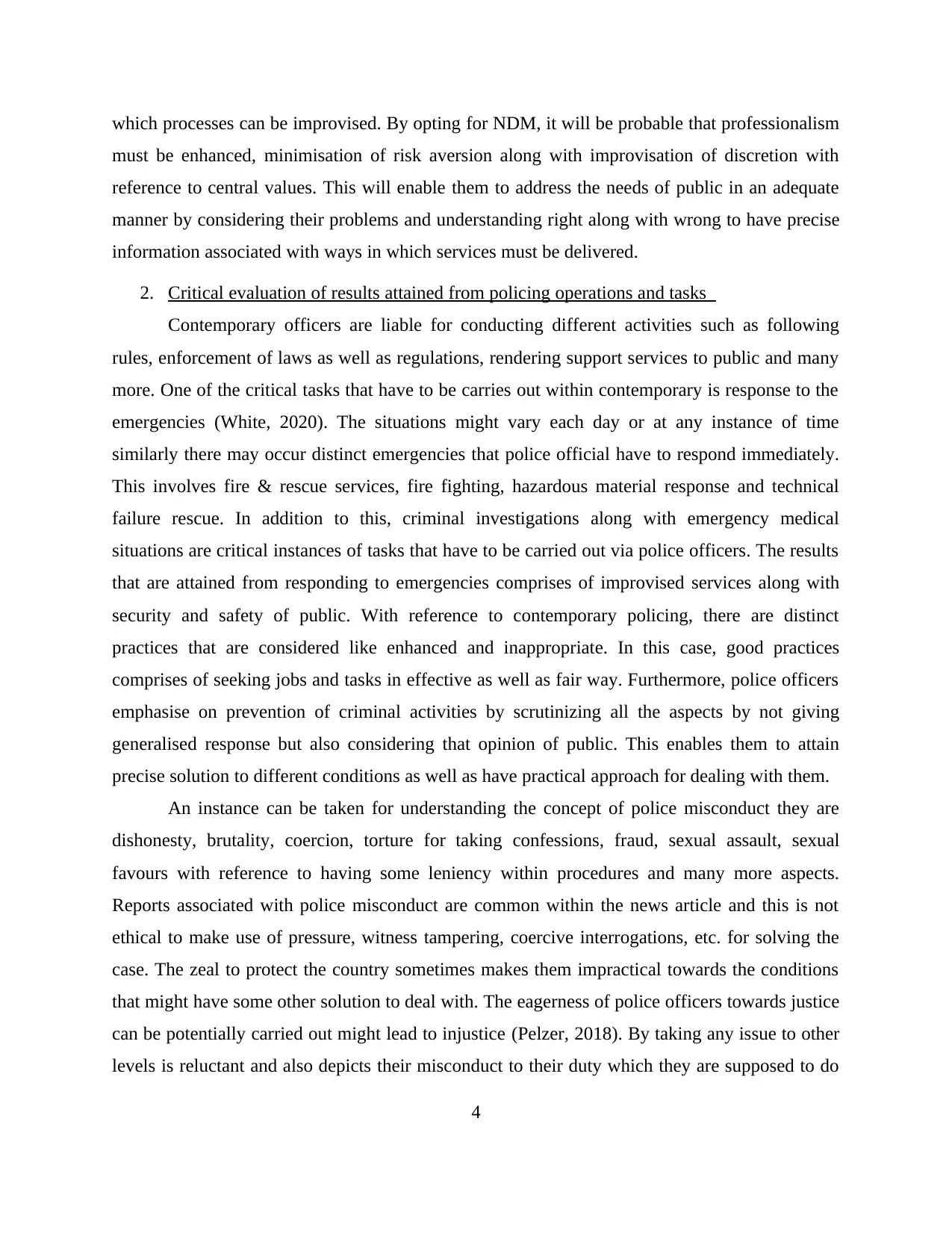
which processes can be improvised. By opting for NDM, it will be probable that professionalism
must be enhanced, minimisation of risk aversion along with improvisation of discretion with
reference to central values. This will enable them to address the needs of public in an adequate
manner by considering their problems and understanding right along with wrong to have precise
information associated with ways in which services must be delivered.
2. Critical evaluation of results attained from policing operations and tasks
Contemporary officers are liable for conducting different activities such as following
rules, enforcement of laws as well as regulations, rendering support services to public and many
more. One of the critical tasks that have to be carries out within contemporary is response to the
emergencies (White, 2020). The situations might vary each day or at any instance of time
similarly there may occur distinct emergencies that police official have to respond immediately.
This involves fire & rescue services, fire fighting, hazardous material response and technical
failure rescue. In addition to this, criminal investigations along with emergency medical
situations are critical instances of tasks that have to be carried out via police officers. The results
that are attained from responding to emergencies comprises of improvised services along with
security and safety of public. With reference to contemporary policing, there are distinct
practices that are considered like enhanced and inappropriate. In this case, good practices
comprises of seeking jobs and tasks in effective as well as fair way. Furthermore, police officers
emphasise on prevention of criminal activities by scrutinizing all the aspects by not giving
generalised response but also considering that opinion of public. This enables them to attain
precise solution to different conditions as well as have practical approach for dealing with them.
An instance can be taken for understanding the concept of police misconduct they are
dishonesty, brutality, coercion, torture for taking confessions, fraud, sexual assault, sexual
favours with reference to having some leniency within procedures and many more aspects.
Reports associated with police misconduct are common within the news article and this is not
ethical to make use of pressure, witness tampering, coercive interrogations, etc. for solving the
case. The zeal to protect the country sometimes makes them impractical towards the conditions
that might have some other solution to deal with. The eagerness of police officers towards justice
can be potentially carried out might lead to injustice (Pelzer, 2018). By taking any issue to other
levels is reluctant and also depicts their misconduct to their duty which they are supposed to do
4
must be enhanced, minimisation of risk aversion along with improvisation of discretion with
reference to central values. This will enable them to address the needs of public in an adequate
manner by considering their problems and understanding right along with wrong to have precise
information associated with ways in which services must be delivered.
2. Critical evaluation of results attained from policing operations and tasks
Contemporary officers are liable for conducting different activities such as following
rules, enforcement of laws as well as regulations, rendering support services to public and many
more. One of the critical tasks that have to be carries out within contemporary is response to the
emergencies (White, 2020). The situations might vary each day or at any instance of time
similarly there may occur distinct emergencies that police official have to respond immediately.
This involves fire & rescue services, fire fighting, hazardous material response and technical
failure rescue. In addition to this, criminal investigations along with emergency medical
situations are critical instances of tasks that have to be carried out via police officers. The results
that are attained from responding to emergencies comprises of improvised services along with
security and safety of public. With reference to contemporary policing, there are distinct
practices that are considered like enhanced and inappropriate. In this case, good practices
comprises of seeking jobs and tasks in effective as well as fair way. Furthermore, police officers
emphasise on prevention of criminal activities by scrutinizing all the aspects by not giving
generalised response but also considering that opinion of public. This enables them to attain
precise solution to different conditions as well as have practical approach for dealing with them.
An instance can be taken for understanding the concept of police misconduct they are
dishonesty, brutality, coercion, torture for taking confessions, fraud, sexual assault, sexual
favours with reference to having some leniency within procedures and many more aspects.
Reports associated with police misconduct are common within the news article and this is not
ethical to make use of pressure, witness tampering, coercive interrogations, etc. for solving the
case. The zeal to protect the country sometimes makes them impractical towards the conditions
that might have some other solution to deal with. The eagerness of police officers towards justice
can be potentially carried out might lead to injustice (Pelzer, 2018). By taking any issue to other
levels is reluctant and also depicts their misconduct to their duty which they are supposed to do
4
⊘ This is a preview!⊘
Do you want full access?
Subscribe today to unlock all pages.

Trusted by 1+ million students worldwide
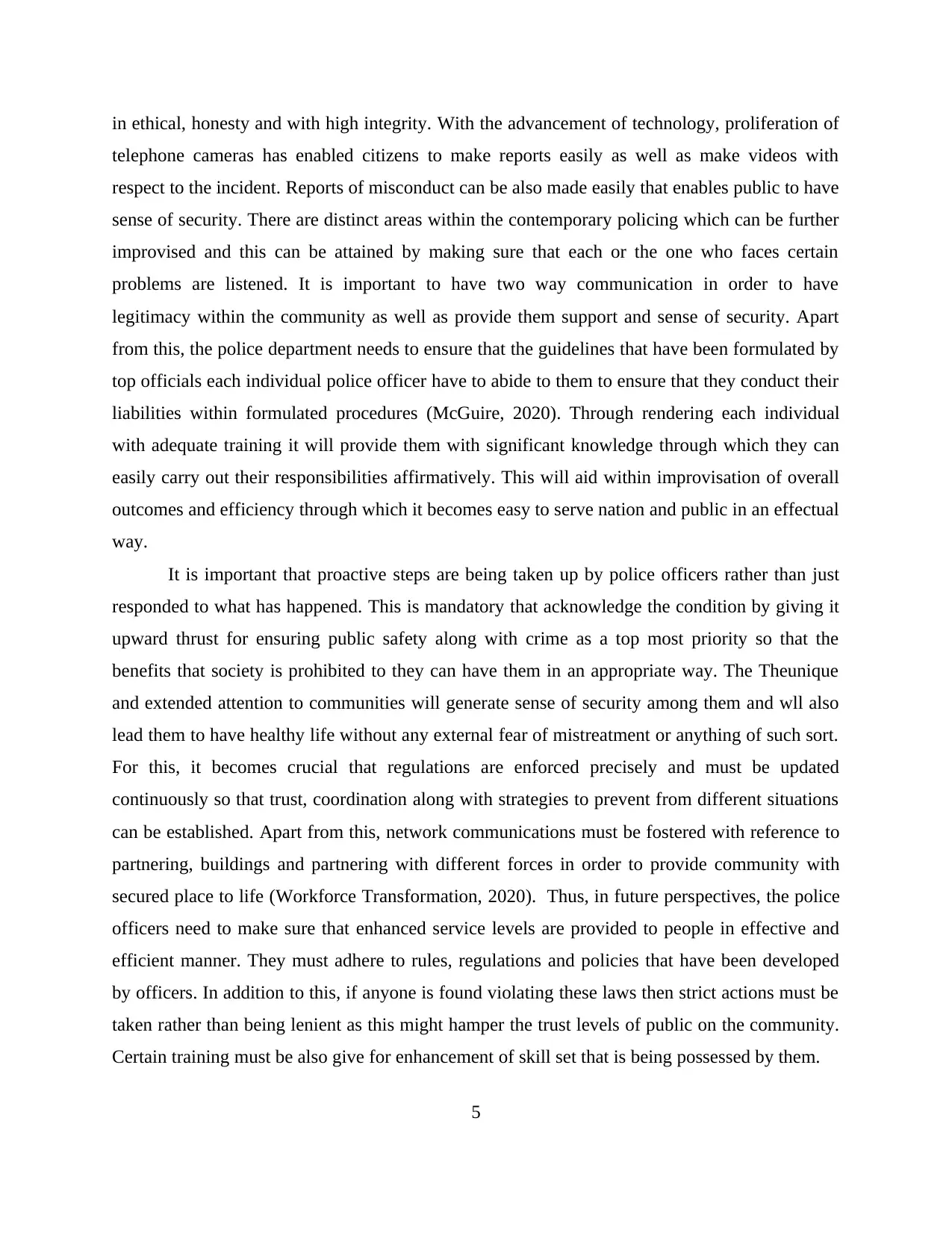
in ethical, honesty and with high integrity. With the advancement of technology, proliferation of
telephone cameras has enabled citizens to make reports easily as well as make videos with
respect to the incident. Reports of misconduct can be also made easily that enables public to have
sense of security. There are distinct areas within the contemporary policing which can be further
improvised and this can be attained by making sure that each or the one who faces certain
problems are listened. It is important to have two way communication in order to have
legitimacy within the community as well as provide them support and sense of security. Apart
from this, the police department needs to ensure that the guidelines that have been formulated by
top officials each individual police officer have to abide to them to ensure that they conduct their
liabilities within formulated procedures (McGuire, 2020). Through rendering each individual
with adequate training it will provide them with significant knowledge through which they can
easily carry out their responsibilities affirmatively. This will aid within improvisation of overall
outcomes and efficiency through which it becomes easy to serve nation and public in an effectual
way.
It is important that proactive steps are being taken up by police officers rather than just
responded to what has happened. This is mandatory that acknowledge the condition by giving it
upward thrust for ensuring public safety along with crime as a top most priority so that the
benefits that society is prohibited to they can have them in an appropriate way. The Theunique
and extended attention to communities will generate sense of security among them and wll also
lead them to have healthy life without any external fear of mistreatment or anything of such sort.
For this, it becomes crucial that regulations are enforced precisely and must be updated
continuously so that trust, coordination along with strategies to prevent from different situations
can be established. Apart from this, network communications must be fostered with reference to
partnering, buildings and partnering with different forces in order to provide community with
secured place to life (Workforce Transformation, 2020). Thus, in future perspectives, the police
officers need to make sure that enhanced service levels are provided to people in effective and
efficient manner. They must adhere to rules, regulations and policies that have been developed
by officers. In addition to this, if anyone is found violating these laws then strict actions must be
taken rather than being lenient as this might hamper the trust levels of public on the community.
Certain training must be also give for enhancement of skill set that is being possessed by them.
5
telephone cameras has enabled citizens to make reports easily as well as make videos with
respect to the incident. Reports of misconduct can be also made easily that enables public to have
sense of security. There are distinct areas within the contemporary policing which can be further
improvised and this can be attained by making sure that each or the one who faces certain
problems are listened. It is important to have two way communication in order to have
legitimacy within the community as well as provide them support and sense of security. Apart
from this, the police department needs to ensure that the guidelines that have been formulated by
top officials each individual police officer have to abide to them to ensure that they conduct their
liabilities within formulated procedures (McGuire, 2020). Through rendering each individual
with adequate training it will provide them with significant knowledge through which they can
easily carry out their responsibilities affirmatively. This will aid within improvisation of overall
outcomes and efficiency through which it becomes easy to serve nation and public in an effectual
way.
It is important that proactive steps are being taken up by police officers rather than just
responded to what has happened. This is mandatory that acknowledge the condition by giving it
upward thrust for ensuring public safety along with crime as a top most priority so that the
benefits that society is prohibited to they can have them in an appropriate way. The Theunique
and extended attention to communities will generate sense of security among them and wll also
lead them to have healthy life without any external fear of mistreatment or anything of such sort.
For this, it becomes crucial that regulations are enforced precisely and must be updated
continuously so that trust, coordination along with strategies to prevent from different situations
can be established. Apart from this, network communications must be fostered with reference to
partnering, buildings and partnering with different forces in order to provide community with
secured place to life (Workforce Transformation, 2020). Thus, in future perspectives, the police
officers need to make sure that enhanced service levels are provided to people in effective and
efficient manner. They must adhere to rules, regulations and policies that have been developed
by officers. In addition to this, if anyone is found violating these laws then strict actions must be
taken rather than being lenient as this might hamper the trust levels of public on the community.
Certain training must be also give for enhancement of skill set that is being possessed by them.
5
Paraphrase This Document
Need a fresh take? Get an instant paraphrase of this document with our AI Paraphraser
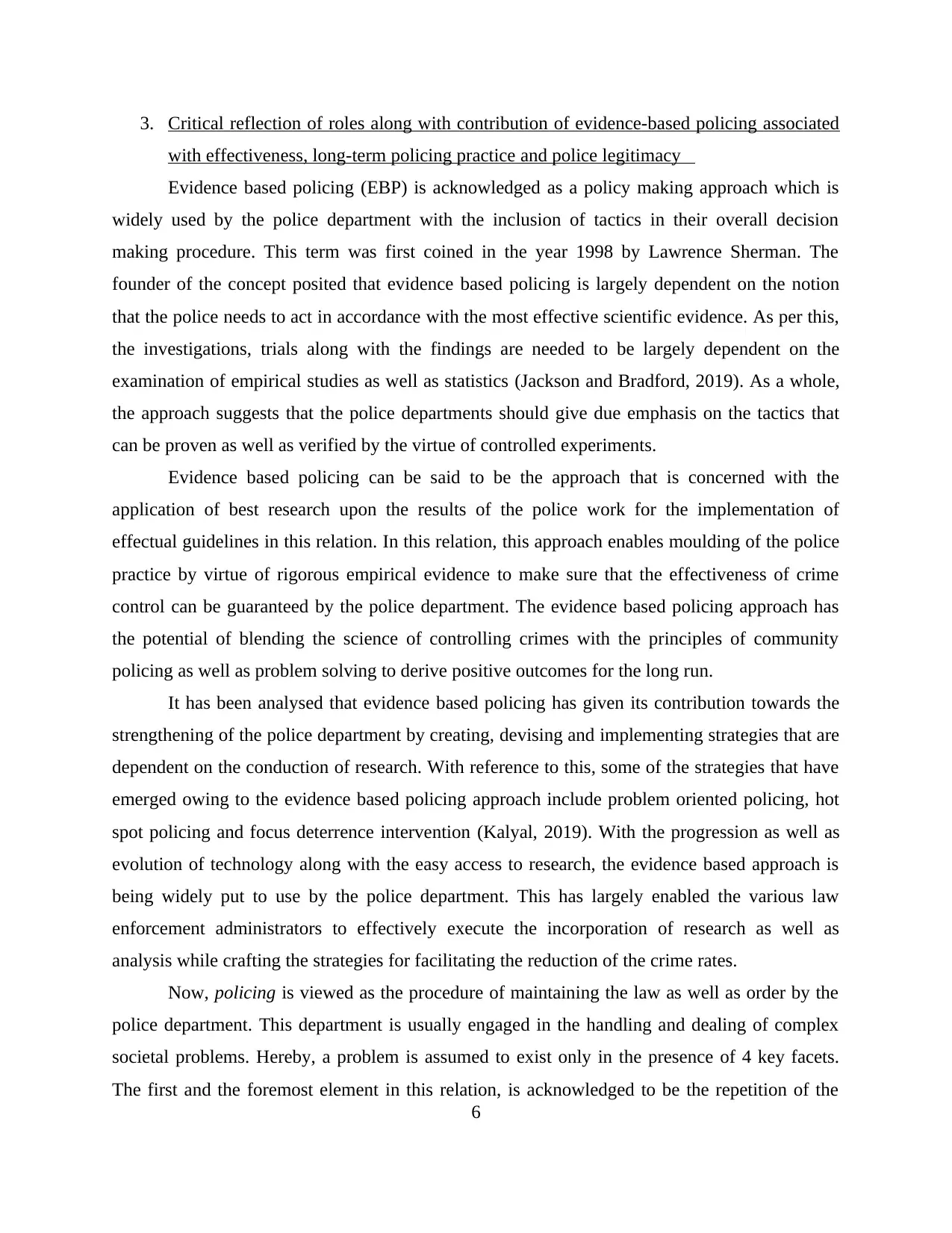
3. Critical reflection of roles along with contribution of evidence-based policing associated
with effectiveness, long-term policing practice and police legitimacy
Evidence based policing (EBP) is acknowledged as a policy making approach which is
widely used by the police department with the inclusion of tactics in their overall decision
making procedure. This term was first coined in the year 1998 by Lawrence Sherman. The
founder of the concept posited that evidence based policing is largely dependent on the notion
that the police needs to act in accordance with the most effective scientific evidence. As per this,
the investigations, trials along with the findings are needed to be largely dependent on the
examination of empirical studies as well as statistics (Jackson and Bradford, 2019). As a whole,
the approach suggests that the police departments should give due emphasis on the tactics that
can be proven as well as verified by the virtue of controlled experiments.
Evidence based policing can be said to be the approach that is concerned with the
application of best research upon the results of the police work for the implementation of
effectual guidelines in this relation. In this relation, this approach enables moulding of the police
practice by virtue of rigorous empirical evidence to make sure that the effectiveness of crime
control can be guaranteed by the police department. The evidence based policing approach has
the potential of blending the science of controlling crimes with the principles of community
policing as well as problem solving to derive positive outcomes for the long run.
It has been analysed that evidence based policing has given its contribution towards the
strengthening of the police department by creating, devising and implementing strategies that are
dependent on the conduction of research. With reference to this, some of the strategies that have
emerged owing to the evidence based policing approach include problem oriented policing, hot
spot policing and focus deterrence intervention (Kalyal, 2019). With the progression as well as
evolution of technology along with the easy access to research, the evidence based approach is
being widely put to use by the police department. This has largely enabled the various law
enforcement administrators to effectively execute the incorporation of research as well as
analysis while crafting the strategies for facilitating the reduction of the crime rates.
Now, policing is viewed as the procedure of maintaining the law as well as order by the
police department. This department is usually engaged in the handling and dealing of complex
societal problems. Hereby, a problem is assumed to exist only in the presence of 4 key facets.
The first and the foremost element in this relation, is acknowledged to be the repetition of the
6
with effectiveness, long-term policing practice and police legitimacy
Evidence based policing (EBP) is acknowledged as a policy making approach which is
widely used by the police department with the inclusion of tactics in their overall decision
making procedure. This term was first coined in the year 1998 by Lawrence Sherman. The
founder of the concept posited that evidence based policing is largely dependent on the notion
that the police needs to act in accordance with the most effective scientific evidence. As per this,
the investigations, trials along with the findings are needed to be largely dependent on the
examination of empirical studies as well as statistics (Jackson and Bradford, 2019). As a whole,
the approach suggests that the police departments should give due emphasis on the tactics that
can be proven as well as verified by the virtue of controlled experiments.
Evidence based policing can be said to be the approach that is concerned with the
application of best research upon the results of the police work for the implementation of
effectual guidelines in this relation. In this relation, this approach enables moulding of the police
practice by virtue of rigorous empirical evidence to make sure that the effectiveness of crime
control can be guaranteed by the police department. The evidence based policing approach has
the potential of blending the science of controlling crimes with the principles of community
policing as well as problem solving to derive positive outcomes for the long run.
It has been analysed that evidence based policing has given its contribution towards the
strengthening of the police department by creating, devising and implementing strategies that are
dependent on the conduction of research. With reference to this, some of the strategies that have
emerged owing to the evidence based policing approach include problem oriented policing, hot
spot policing and focus deterrence intervention (Kalyal, 2019). With the progression as well as
evolution of technology along with the easy access to research, the evidence based approach is
being widely put to use by the police department. This has largely enabled the various law
enforcement administrators to effectively execute the incorporation of research as well as
analysis while crafting the strategies for facilitating the reduction of the crime rates.
Now, policing is viewed as the procedure of maintaining the law as well as order by the
police department. This department is usually engaged in the handling and dealing of complex
societal problems. Hereby, a problem is assumed to exist only in the presence of 4 key facets.
The first and the foremost element in this relation, is acknowledged to be the repetition of the
6
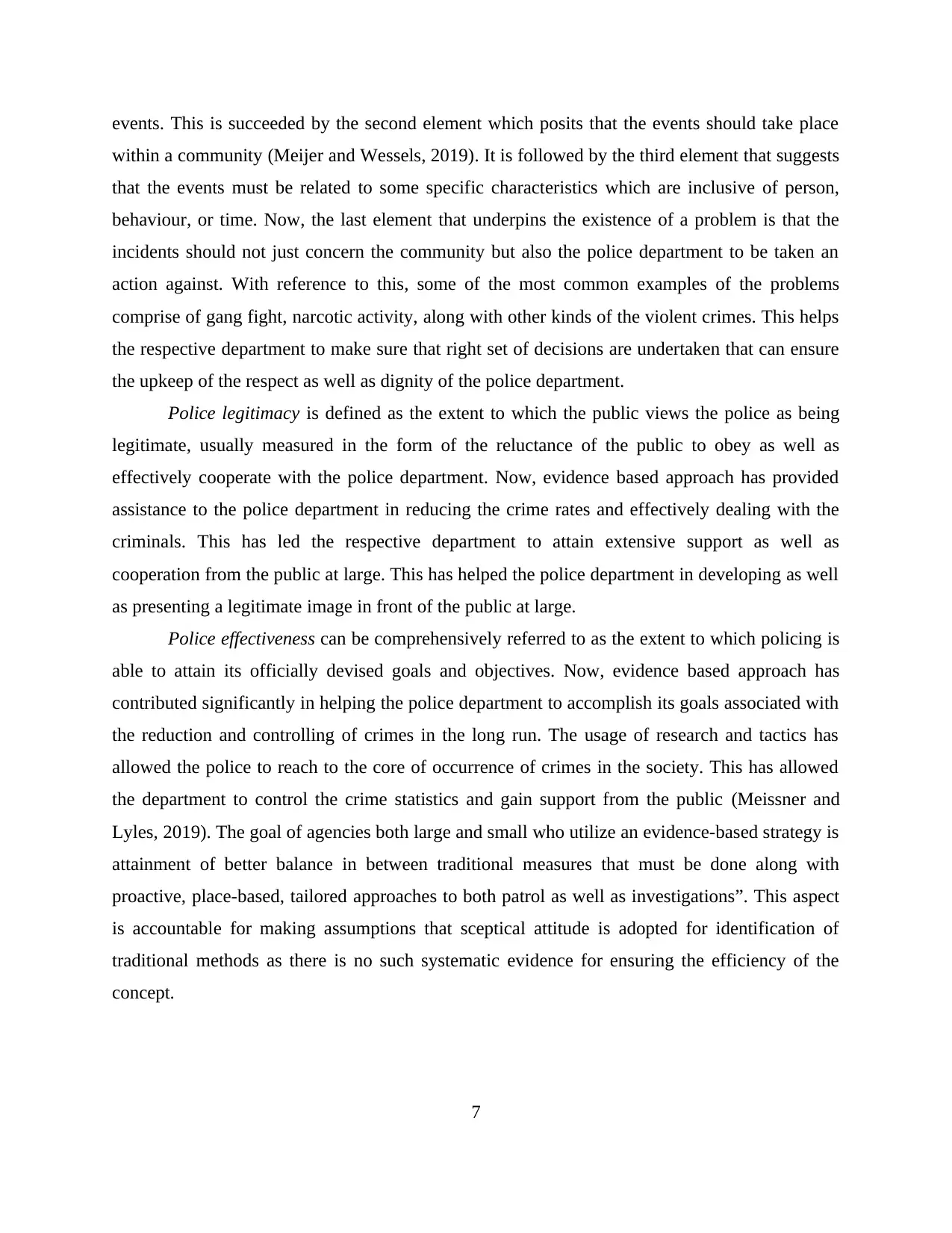
events. This is succeeded by the second element which posits that the events should take place
within a community (Meijer and Wessels, 2019). It is followed by the third element that suggests
that the events must be related to some specific characteristics which are inclusive of person,
behaviour, or time. Now, the last element that underpins the existence of a problem is that the
incidents should not just concern the community but also the police department to be taken an
action against. With reference to this, some of the most common examples of the problems
comprise of gang fight, narcotic activity, along with other kinds of the violent crimes. This helps
the respective department to make sure that right set of decisions are undertaken that can ensure
the upkeep of the respect as well as dignity of the police department.
Police legitimacy is defined as the extent to which the public views the police as being
legitimate, usually measured in the form of the reluctance of the public to obey as well as
effectively cooperate with the police department. Now, evidence based approach has provided
assistance to the police department in reducing the crime rates and effectively dealing with the
criminals. This has led the respective department to attain extensive support as well as
cooperation from the public at large. This has helped the police department in developing as well
as presenting a legitimate image in front of the public at large.
Police effectiveness can be comprehensively referred to as the extent to which policing is
able to attain its officially devised goals and objectives. Now, evidence based approach has
contributed significantly in helping the police department to accomplish its goals associated with
the reduction and controlling of crimes in the long run. The usage of research and tactics has
allowed the police to reach to the core of occurrence of crimes in the society. This has allowed
the department to control the crime statistics and gain support from the public (Meissner and
Lyles, 2019). The goal of agencies both large and small who utilize an evidence-based strategy is
attainment of better balance in between traditional measures that must be done along with
proactive, place-based, tailored approaches to both patrol as well as investigations”. This aspect
is accountable for making assumptions that sceptical attitude is adopted for identification of
traditional methods as there is no such systematic evidence for ensuring the efficiency of the
concept.
7
within a community (Meijer and Wessels, 2019). It is followed by the third element that suggests
that the events must be related to some specific characteristics which are inclusive of person,
behaviour, or time. Now, the last element that underpins the existence of a problem is that the
incidents should not just concern the community but also the police department to be taken an
action against. With reference to this, some of the most common examples of the problems
comprise of gang fight, narcotic activity, along with other kinds of the violent crimes. This helps
the respective department to make sure that right set of decisions are undertaken that can ensure
the upkeep of the respect as well as dignity of the police department.
Police legitimacy is defined as the extent to which the public views the police as being
legitimate, usually measured in the form of the reluctance of the public to obey as well as
effectively cooperate with the police department. Now, evidence based approach has provided
assistance to the police department in reducing the crime rates and effectively dealing with the
criminals. This has led the respective department to attain extensive support as well as
cooperation from the public at large. This has helped the police department in developing as well
as presenting a legitimate image in front of the public at large.
Police effectiveness can be comprehensively referred to as the extent to which policing is
able to attain its officially devised goals and objectives. Now, evidence based approach has
contributed significantly in helping the police department to accomplish its goals associated with
the reduction and controlling of crimes in the long run. The usage of research and tactics has
allowed the police to reach to the core of occurrence of crimes in the society. This has allowed
the department to control the crime statistics and gain support from the public (Meissner and
Lyles, 2019). The goal of agencies both large and small who utilize an evidence-based strategy is
attainment of better balance in between traditional measures that must be done along with
proactive, place-based, tailored approaches to both patrol as well as investigations”. This aspect
is accountable for making assumptions that sceptical attitude is adopted for identification of
traditional methods as there is no such systematic evidence for ensuring the efficiency of the
concept.
7
⊘ This is a preview!⊘
Do you want full access?
Subscribe today to unlock all pages.

Trusted by 1+ million students worldwide
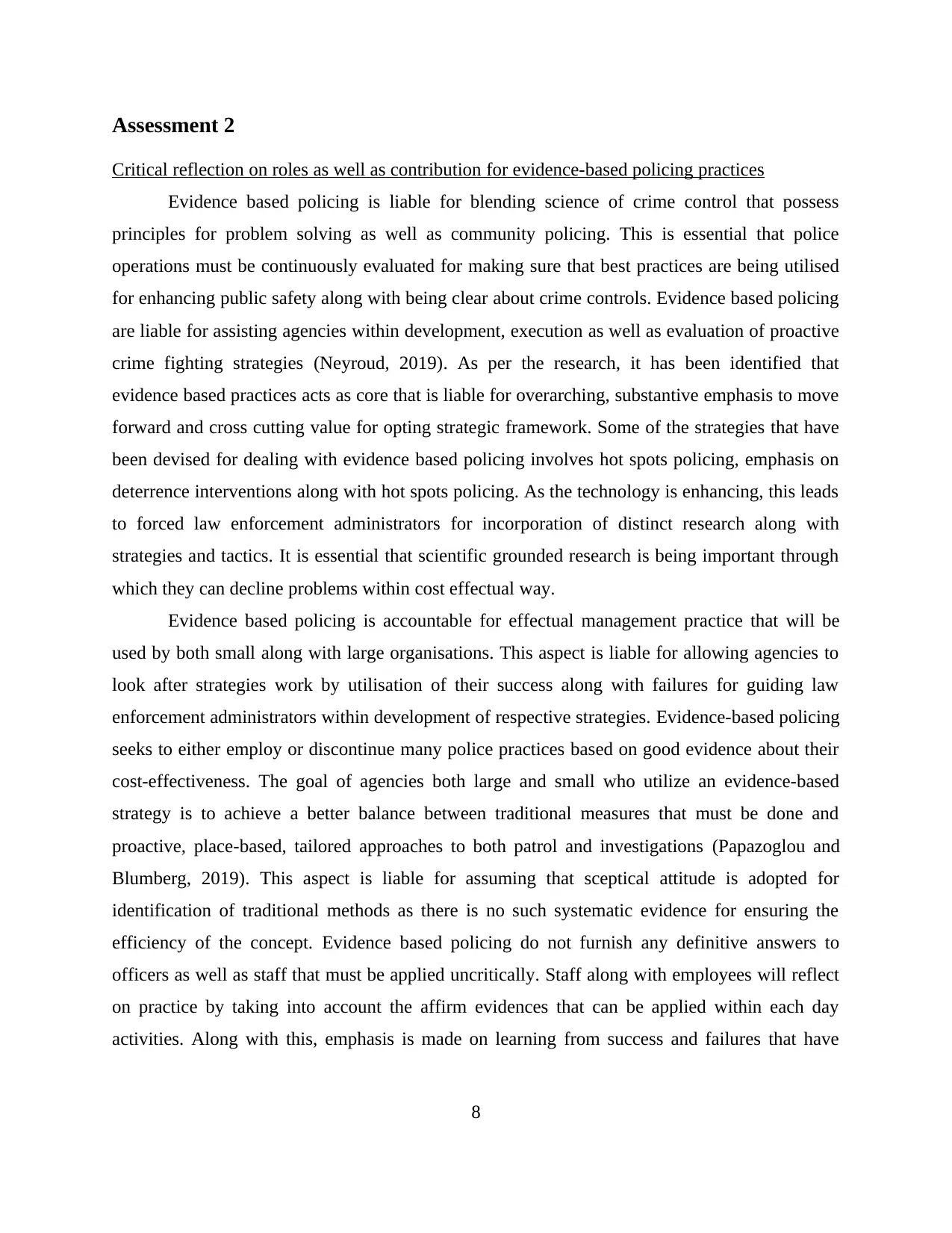
Assessment 2
Critical reflection on roles as well as contribution for evidence-based policing practices
Evidence based policing is liable for blending science of crime control that possess
principles for problem solving as well as community policing. This is essential that police
operations must be continuously evaluated for making sure that best practices are being utilised
for enhancing public safety along with being clear about crime controls. Evidence based policing
are liable for assisting agencies within development, execution as well as evaluation of proactive
crime fighting strategies (Neyroud, 2019). As per the research, it has been identified that
evidence based practices acts as core that is liable for overarching, substantive emphasis to move
forward and cross cutting value for opting strategic framework. Some of the strategies that have
been devised for dealing with evidence based policing involves hot spots policing, emphasis on
deterrence interventions along with hot spots policing. As the technology is enhancing, this leads
to forced law enforcement administrators for incorporation of distinct research along with
strategies and tactics. It is essential that scientific grounded research is being important through
which they can decline problems within cost effectual way.
Evidence based policing is accountable for effectual management practice that will be
used by both small along with large organisations. This aspect is liable for allowing agencies to
look after strategies work by utilisation of their success along with failures for guiding law
enforcement administrators within development of respective strategies. Evidence-based policing
seeks to either employ or discontinue many police practices based on good evidence about their
cost-effectiveness. The goal of agencies both large and small who utilize an evidence-based
strategy is to achieve a better balance between traditional measures that must be done and
proactive, place-based, tailored approaches to both patrol and investigations (Papazoglou and
Blumberg, 2019). This aspect is liable for assuming that sceptical attitude is adopted for
identification of traditional methods as there is no such systematic evidence for ensuring the
efficiency of the concept. Evidence based policing do not furnish any definitive answers to
officers as well as staff that must be applied uncritically. Staff along with employees will reflect
on practice by taking into account the affirm evidences that can be applied within each day
activities. Along with this, emphasis is made on learning from success and failures that have
8
Critical reflection on roles as well as contribution for evidence-based policing practices
Evidence based policing is liable for blending science of crime control that possess
principles for problem solving as well as community policing. This is essential that police
operations must be continuously evaluated for making sure that best practices are being utilised
for enhancing public safety along with being clear about crime controls. Evidence based policing
are liable for assisting agencies within development, execution as well as evaluation of proactive
crime fighting strategies (Neyroud, 2019). As per the research, it has been identified that
evidence based practices acts as core that is liable for overarching, substantive emphasis to move
forward and cross cutting value for opting strategic framework. Some of the strategies that have
been devised for dealing with evidence based policing involves hot spots policing, emphasis on
deterrence interventions along with hot spots policing. As the technology is enhancing, this leads
to forced law enforcement administrators for incorporation of distinct research along with
strategies and tactics. It is essential that scientific grounded research is being important through
which they can decline problems within cost effectual way.
Evidence based policing is accountable for effectual management practice that will be
used by both small along with large organisations. This aspect is liable for allowing agencies to
look after strategies work by utilisation of their success along with failures for guiding law
enforcement administrators within development of respective strategies. Evidence-based policing
seeks to either employ or discontinue many police practices based on good evidence about their
cost-effectiveness. The goal of agencies both large and small who utilize an evidence-based
strategy is to achieve a better balance between traditional measures that must be done and
proactive, place-based, tailored approaches to both patrol and investigations (Papazoglou and
Blumberg, 2019). This aspect is liable for assuming that sceptical attitude is adopted for
identification of traditional methods as there is no such systematic evidence for ensuring the
efficiency of the concept. Evidence based policing do not furnish any definitive answers to
officers as well as staff that must be applied uncritically. Staff along with employees will reflect
on practice by taking into account the affirm evidences that can be applied within each day
activities. Along with this, emphasis is made on learning from success and failures that have
8
Paraphrase This Document
Need a fresh take? Get an instant paraphrase of this document with our AI Paraphraser
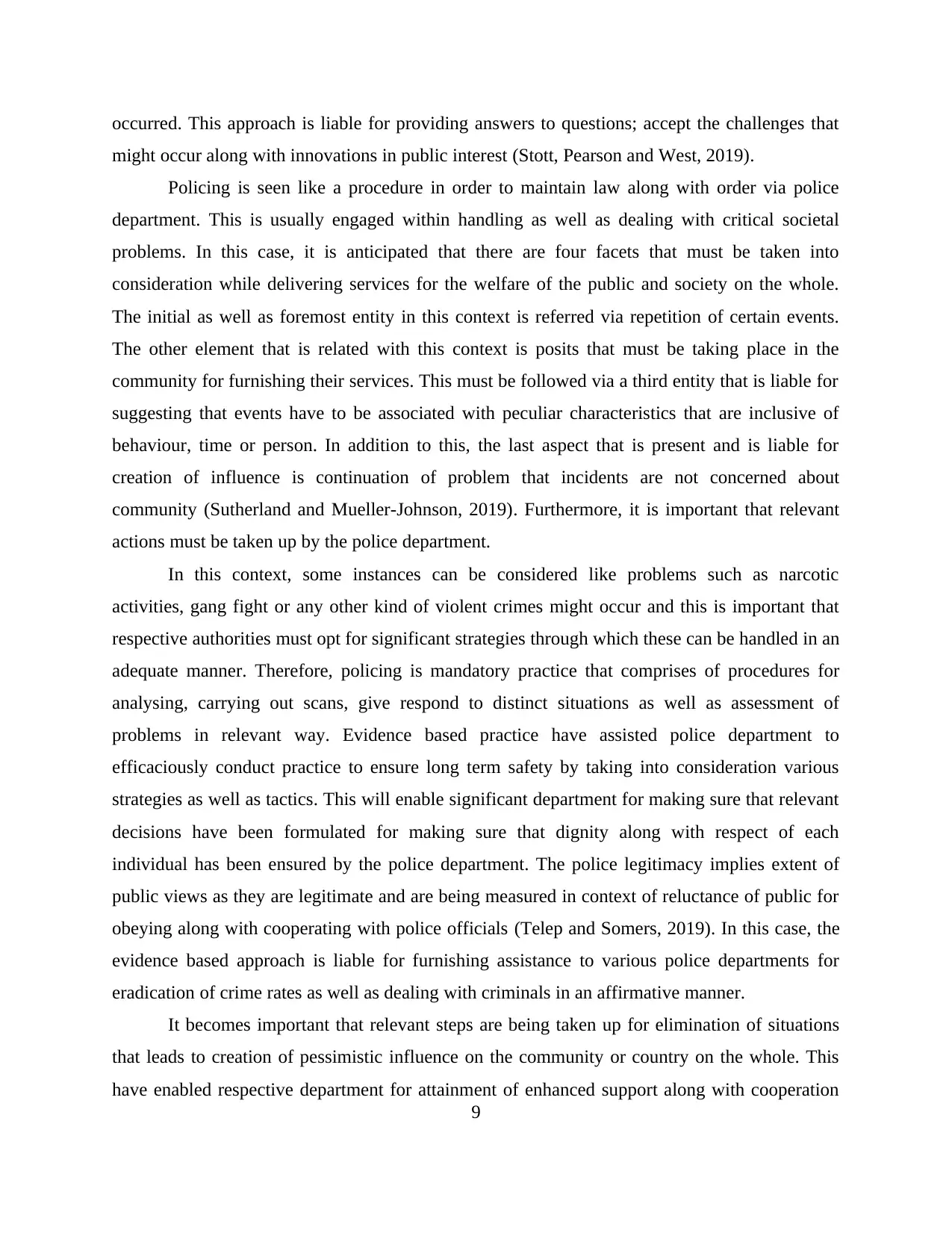
occurred. This approach is liable for providing answers to questions; accept the challenges that
might occur along with innovations in public interest (Stott, Pearson and West, 2019).
Policing is seen like a procedure in order to maintain law along with order via police
department. This is usually engaged within handling as well as dealing with critical societal
problems. In this case, it is anticipated that there are four facets that must be taken into
consideration while delivering services for the welfare of the public and society on the whole.
The initial as well as foremost entity in this context is referred via repetition of certain events.
The other element that is related with this context is posits that must be taking place in the
community for furnishing their services. This must be followed via a third entity that is liable for
suggesting that events have to be associated with peculiar characteristics that are inclusive of
behaviour, time or person. In addition to this, the last aspect that is present and is liable for
creation of influence is continuation of problem that incidents are not concerned about
community (Sutherland and Mueller-Johnson, 2019). Furthermore, it is important that relevant
actions must be taken up by the police department.
In this context, some instances can be considered like problems such as narcotic
activities, gang fight or any other kind of violent crimes might occur and this is important that
respective authorities must opt for significant strategies through which these can be handled in an
adequate manner. Therefore, policing is mandatory practice that comprises of procedures for
analysing, carrying out scans, give respond to distinct situations as well as assessment of
problems in relevant way. Evidence based practice have assisted police department to
efficaciously conduct practice to ensure long term safety by taking into consideration various
strategies as well as tactics. This will enable significant department for making sure that relevant
decisions have been formulated for making sure that dignity along with respect of each
individual has been ensured by the police department. The police legitimacy implies extent of
public views as they are legitimate and are being measured in context of reluctance of public for
obeying along with cooperating with police officials (Telep and Somers, 2019). In this case, the
evidence based approach is liable for furnishing assistance to various police departments for
eradication of crime rates as well as dealing with criminals in an affirmative manner.
It becomes important that relevant steps are being taken up for elimination of situations
that leads to creation of pessimistic influence on the community or country on the whole. This
have enabled respective department for attainment of enhanced support along with cooperation
9
might occur along with innovations in public interest (Stott, Pearson and West, 2019).
Policing is seen like a procedure in order to maintain law along with order via police
department. This is usually engaged within handling as well as dealing with critical societal
problems. In this case, it is anticipated that there are four facets that must be taken into
consideration while delivering services for the welfare of the public and society on the whole.
The initial as well as foremost entity in this context is referred via repetition of certain events.
The other element that is related with this context is posits that must be taking place in the
community for furnishing their services. This must be followed via a third entity that is liable for
suggesting that events have to be associated with peculiar characteristics that are inclusive of
behaviour, time or person. In addition to this, the last aspect that is present and is liable for
creation of influence is continuation of problem that incidents are not concerned about
community (Sutherland and Mueller-Johnson, 2019). Furthermore, it is important that relevant
actions must be taken up by the police department.
In this context, some instances can be considered like problems such as narcotic
activities, gang fight or any other kind of violent crimes might occur and this is important that
respective authorities must opt for significant strategies through which these can be handled in an
adequate manner. Therefore, policing is mandatory practice that comprises of procedures for
analysing, carrying out scans, give respond to distinct situations as well as assessment of
problems in relevant way. Evidence based practice have assisted police department to
efficaciously conduct practice to ensure long term safety by taking into consideration various
strategies as well as tactics. This will enable significant department for making sure that relevant
decisions have been formulated for making sure that dignity along with respect of each
individual has been ensured by the police department. The police legitimacy implies extent of
public views as they are legitimate and are being measured in context of reluctance of public for
obeying along with cooperating with police officials (Telep and Somers, 2019). In this case, the
evidence based approach is liable for furnishing assistance to various police departments for
eradication of crime rates as well as dealing with criminals in an affirmative manner.
It becomes important that relevant steps are being taken up for elimination of situations
that leads to creation of pessimistic influence on the community or country on the whole. This
have enabled respective department for attainment of enhanced support along with cooperation
9
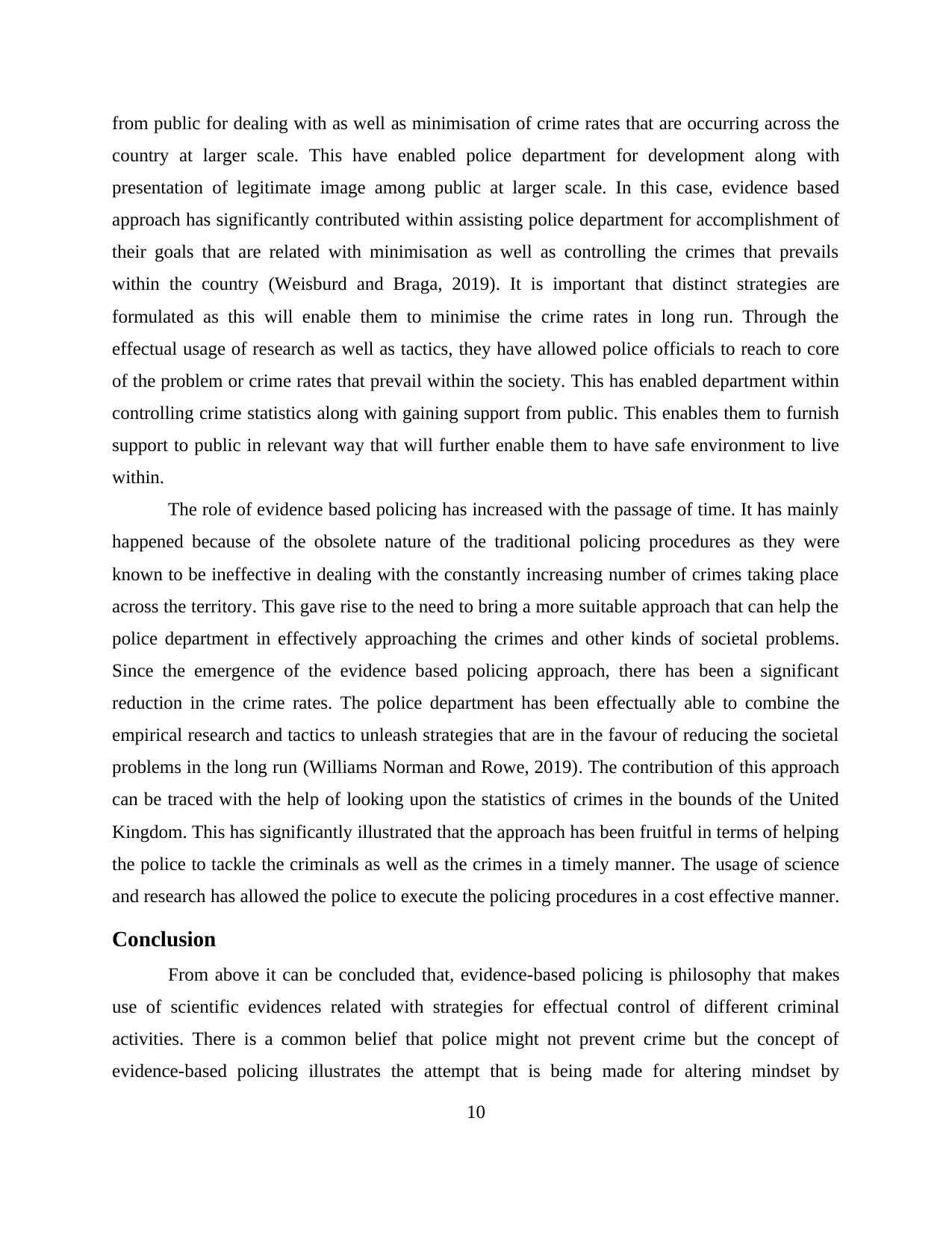
from public for dealing with as well as minimisation of crime rates that are occurring across the
country at larger scale. This have enabled police department for development along with
presentation of legitimate image among public at larger scale. In this case, evidence based
approach has significantly contributed within assisting police department for accomplishment of
their goals that are related with minimisation as well as controlling the crimes that prevails
within the country (Weisburd and Braga, 2019). It is important that distinct strategies are
formulated as this will enable them to minimise the crime rates in long run. Through the
effectual usage of research as well as tactics, they have allowed police officials to reach to core
of the problem or crime rates that prevail within the society. This has enabled department within
controlling crime statistics along with gaining support from public. This enables them to furnish
support to public in relevant way that will further enable them to have safe environment to live
within.
The role of evidence based policing has increased with the passage of time. It has mainly
happened because of the obsolete nature of the traditional policing procedures as they were
known to be ineffective in dealing with the constantly increasing number of crimes taking place
across the territory. This gave rise to the need to bring a more suitable approach that can help the
police department in effectively approaching the crimes and other kinds of societal problems.
Since the emergence of the evidence based policing approach, there has been a significant
reduction in the crime rates. The police department has been effectually able to combine the
empirical research and tactics to unleash strategies that are in the favour of reducing the societal
problems in the long run (Williams Norman and Rowe, 2019). The contribution of this approach
can be traced with the help of looking upon the statistics of crimes in the bounds of the United
Kingdom. This has significantly illustrated that the approach has been fruitful in terms of helping
the police to tackle the criminals as well as the crimes in a timely manner. The usage of science
and research has allowed the police to execute the policing procedures in a cost effective manner.
Conclusion
From above it can be concluded that, evidence-based policing is philosophy that makes
use of scientific evidences related with strategies for effectual control of different criminal
activities. There is a common belief that police might not prevent crime but the concept of
evidence-based policing illustrates the attempt that is being made for altering mindset by
10
country at larger scale. This have enabled police department for development along with
presentation of legitimate image among public at larger scale. In this case, evidence based
approach has significantly contributed within assisting police department for accomplishment of
their goals that are related with minimisation as well as controlling the crimes that prevails
within the country (Weisburd and Braga, 2019). It is important that distinct strategies are
formulated as this will enable them to minimise the crime rates in long run. Through the
effectual usage of research as well as tactics, they have allowed police officials to reach to core
of the problem or crime rates that prevail within the society. This has enabled department within
controlling crime statistics along with gaining support from public. This enables them to furnish
support to public in relevant way that will further enable them to have safe environment to live
within.
The role of evidence based policing has increased with the passage of time. It has mainly
happened because of the obsolete nature of the traditional policing procedures as they were
known to be ineffective in dealing with the constantly increasing number of crimes taking place
across the territory. This gave rise to the need to bring a more suitable approach that can help the
police department in effectively approaching the crimes and other kinds of societal problems.
Since the emergence of the evidence based policing approach, there has been a significant
reduction in the crime rates. The police department has been effectually able to combine the
empirical research and tactics to unleash strategies that are in the favour of reducing the societal
problems in the long run (Williams Norman and Rowe, 2019). The contribution of this approach
can be traced with the help of looking upon the statistics of crimes in the bounds of the United
Kingdom. This has significantly illustrated that the approach has been fruitful in terms of helping
the police to tackle the criminals as well as the crimes in a timely manner. The usage of science
and research has allowed the police to execute the policing procedures in a cost effective manner.
Conclusion
From above it can be concluded that, evidence-based policing is philosophy that makes
use of scientific evidences related with strategies for effectual control of different criminal
activities. There is a common belief that police might not prevent crime but the concept of
evidence-based policing illustrates the attempt that is being made for altering mindset by
10
⊘ This is a preview!⊘
Do you want full access?
Subscribe today to unlock all pages.

Trusted by 1+ million students worldwide
1 out of 15
Related Documents
Your All-in-One AI-Powered Toolkit for Academic Success.
+13062052269
info@desklib.com
Available 24*7 on WhatsApp / Email
![[object Object]](/_next/static/media/star-bottom.7253800d.svg)
Unlock your academic potential
Copyright © 2020–2026 A2Z Services. All Rights Reserved. Developed and managed by ZUCOL.





